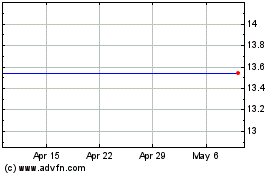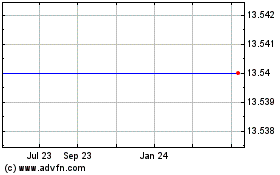Argentina Orders Glacier Inventory For Protection Effort
March 01 2011 - 11:20AM
Dow Jones News
The Argentine government has taken the first step toward
implementing a glacier protection law, ordering a nationwide
inventory of glacial ice that will determine which areas will be
put off limits to mining.
President Cristina Fernandez issued a decree Tuesday ordering an
extensive study of the country's glaciers, peri-glacial areas and
changes to the glaciers in recent decades.
Preliminary data will be available in a year, although it will
likely take five years to complete the full study, Environment
Secretary Juan Jose Mussi said at a press conference.
Argentina's Congress passed legislation in September limiting
economic activity in the areas surrounding glaciers, and
environmental groups are likely to try and use the new law to block
a number of mining projects.
Environmentalists have criticized the government for dragging
its feet in implementing the law. The bill gave the government 90
days to put it into effect, but that deadline passed in
January.
The administration has been less than enthusiastic about the
glacier law, with heavy criticism coming from a number of governors
in mining provinces who say it will stunt development. In 2008,
Fernandez vetoed similar legislation, but signed the bill Congress
sent to her last year.
The law already faces several legal challenges in the courts,
with a number of provinces questioning its constitutionality.
In November, a federal judge in San Juan province suspended key
provisions of the law at the behest of labor unions and mining
industry associations until the Supreme Court can rule on its
validity. Barrick Gold Corp. (ABX, ABX.T) convinced the same judge
to suspend the glacier law with regards to its Veladero and Pascua
Lama mines. The Pascua Lama gold and silver mine, currently under
construction, carries an estimated price tag of $3.3 billion to
$3.6 billion. Production is scheduled to start during the first
half of 2013.
Argentina's constitution limits the federal government to
setting the basic standards for environmental protection, but
leaves the implementation of those standards to the provinces.
However, the courts have yet to clearly define the fine line
between state and federal rights and the issue will likely go to
the Supreme Court.
In addition, the conflict hinges on the definition of the
so-called peri-glacial areas protected by the law, which could be
limited to a tight perimeter around the glaciers or extended to
half the country under its broadest interpretation. That is likely
to be the focal point for legal challenges by
environmentalists.
The Center for Human Rights and Environment, or Cedha, has begun
to conduct its own survey of the country's glaciers and charges
that Xstrata PLC's (XTA.LN) Filo Colorado and Yamana Gold Inc.'s
(AUY, YRI.T) Agua Rica projects will run afoul of the glacier
Law.
Barrick said its activities don't take place on glaciers and
that it has taken a range of measures to protect water resources,
glaciers and other sensitive environmental areas around its
project. However, the company is getting ready to fend off lawsuits
from environmentalists.
"It is possible that others may attempt to bring legal
challenges seeking to restrict our activities based on the new
federal law. We will vigorously oppose any such challenges,"
Barrick said in its fourth quarter earnings release.
-By Shane Romig, Dow Jones Newswires; 54-11-4103-6738;
shane.romig@dowjones.com
Barrick Gold (NYSE:ABX)
Historical Stock Chart
From Dec 2024 to Jan 2025

Barrick Gold (NYSE:ABX)
Historical Stock Chart
From Jan 2024 to Jan 2025
